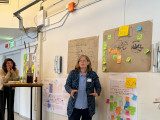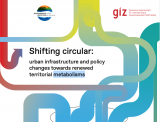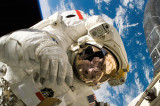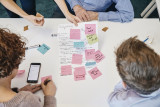Stay in the know on all smart updates of your favorite topics.
Circular Challenge: How Can We Stimulate Circular Business Models in the Electric Vehicle Charging Infrastructure Chain?

Circular initiatives often struggle to progress beyond the pilot phase, including circular charging infrastructure. Numerous barriers hinder these circular initiatives:
• Lack of data on products and how circular/sustainable they are.
• Difficulty in implementing circularity across the entire production chain.
• Regulatory obstacles.
• Current higher costs associated with circular production, leading to more expensive products.
To overcome these barriers, adjustments to regulations are necessary to better align with circular initiatives, alongside the establishment of shared ownership within the production chain.
Research project - Shifting circular: urban infrastructure and policy changes towards renewed territorial metabolisms

Find out this comparative analysis of critical policies and infrastructures essential for advancing the urban circular transition!
This piece of work draws upon the insights garnered from the experiences of four European cities, including Amsterdam. Reflecting on pivotal levers and obstacles pivotal in catalyzing socio-ecological transformations towards alternative urban metabolisms forms the crux of this exploration. This insightful report, commissioned by the Deutsche Gesellschaft für Internationale Zusammenarbeit (GIZ), the German agency for international cooperation, has been recently unveiled within the Circular Economy Solutions Dialogue (CESD) under the auspices of the Think20 (T20) working group focused on sustainable urbanization.
As a PhD researcher, I am now embarked on another research project on circular policies and strategies. One of my fieldwork is based in Amsterdam, spanning from January to April 2024. I am enthusiastic about establishing connections and potentially collaborating during my stay in the city!
The 100 Intelligent Cities Challenge

The 100 Intelligent Cities Challenge (ICC) is a European Commission initiative that supports 136 cities in using cutting-edge technologies to lead the intelligent, green and socially responsible recovery. The ICC cities and their local ecosystems will be engines for the recovery of their local economy, create new jobs, and strengthen citizen participation and wellbeing.
The ICC is part of a wider EU support system that recognises the importance of delivering on the promises made by the European Green Deal, the digital strategy, and other EU policies. It looks to move towards a more digital, service-oriented and low-carbon economy, supported by a knowledge-based society, that enables circular economy systems through ‘local value loops’, evidence-based reskilling, and sustainable investments.
Participating cities receive one-to-one strategic advice from international experts on fine thematic strands: green economy and local green deals, improving the citizen participation and the digitalisation of public administration, green and digital transition in tourism, resilience of local supply chains, up- and reskilling of the workforce. ICC Cities are also supported by transversal services on access to data, access to finance and through a marketplace full of innovative solutions.
The Amsterdam Region, represented by Amsterdam Economic Board and Amsterdam Smart City (ASC) is one of the ICC mentor regions, alongside European mentor cities Aarhus, Antwerp, Barcelona, Espoo, Hamburg, Nice, Porto, Rijeka and international mentors Medellin, Singapore and Toronto. By participating in the ICC, the Amsterdam Region will share its experience and learn from other best practices related to multi-stakeholder collaboration, innovation ecosystems, circular economy and citizen participation.
ICC Updates:
• Launch of 100 Intelligent Cities Challenge
• ICC Challenge Mayors’ Summit
• Launch of ICC Renovation Action Group
• Public Kick-off 2nd ICC City Lab
• ICC - 3rd City Lab
• 200 Intelligent & Climate Neutral Cities Jam
• ICC - 4th City Lab
• Invitation to co-create European transition pathways for more resilient, greener and digital industrial ecosystems
• ICC - 5th City Lab
• Developing circular and sharing economy practices in cities
• The 100 Intelligent Cities Challenge: Looking Back & Looking Forward (End of Phase 1)
Space for Food: Space technology for sustainable food systems on Earth

A big part of innovation in space technology revolves around finding smart, efficient and circular ways to establish a life support system for the astronauts going on the trip. Since it’s simply impossible to bring an end-less amount of resources on board, how do you make sure the astronauts can eat, drink and breath?
What if we view “cities as spaceships”; in terms of urban environments being ‘closed-loop systems’? This gives way to the idea that the same space technology developed by ESA could be applied to increase circularity in a city like Amsterdam.
Towards circular resource streams
Municipal wastewater is a great resource for nutrients and water reuse. The Space for Food project aims to use space technology in recovering nutrients and cleaning wastewater that can be used in food production using vertical farming. Closing the loops from waste to resource will help improving the impact in the environment, while creating resilience for the cities.
For this reason, the project will test a proof of concept using a raceway reactor for purple bacteria cultivation on brewery and municipal yellow wastewater at Marineterrein Amsterdam Living Lab. The biomass will be used as slow release fertilizer and bio-stimulant for cultivation of vegetables.
Communication Alliance for a Circular Region (CACR)

De taskforce Communication Alliance for a Circular Region (CACR) wil de circulaire economie in de Metropoolregio Amsterdam versnellen met praktische verhalen voor en over ondernemers en bedrijven. We nodigen iedereen uit mee te doen met de discussie op amsterdamsmartcity.com. De CACR bestaat uit: Hogeschool van Amsterdam | Gemeente Amsterdam | Amsterdam Economic Board | Amsterdam Smart City | Metabolic en AMS Institute.
Artikelen 'Circulaire economie en data'
• Volop kansen in de nieuwe circulaire werkelijkheid / Data zijn de zuurstof van de circulaire economie: deel 1
• Slim datagebruik in de circulaire economie: de drie belangrijkste redenen / Data zijn de zuurstof van de circulaire economie: deel 2
• 100.000 bedrijven restafvalvrij in 2025
• Slim datagebruik in de circulaire economie: dit is wat bedrijven zelf kunnen doen / Data zijn de zuurstof van de circulaire economie: deel 3
Artikelen circular strategies
Maak je bedrijf toekomstbestendig met deze circulaire strategieën
--------------------------------------------------------------------------------
The taskforce Communication Alliance for a Circular Region (CACR) is working to accelerate the circular economy in the Amsterdam Metropolitan Area, sharing practical stories for and about entrepreneurs and businesses. The CACR is an initiative by Amsterdam University of Applied Sciences | City of Amsterdam | Amsterdam Economic Board | Amsterdam Smart City | Metabolic | AMS Institute.
Articles 'Circular economy and data'
• A wealth of opportunities in the new circular reality / Data is the oxygen that the circular economy thrives on: part 1
• Smart data usage in the circular economy: 3 key reasons / Data is the oxygen that the circular economy thrives on: part 2
• 100,000 companies residual waste-free by 2025
• Smart data use in the circular economy: this is what companies can do themselves / Data is the oxygen that the circular economy thrives on: part 3
Articles: Future-proof your business using circular strategies
Wicked Problems

Te wicked? Niet voor ons.
Wij werken allemaal aan urgente, complexe, maatschappelijke uitdagingen. Issues die schier onoplosbaar lijken, van dilemma’s en paradoxen omgeven, nog niet duidelijk hoe het moet. Wel is duidelijk dát het moet, dat we elkaar nodig
hebben en dat we er NU aan moeten beginnen. Om met de woorden van Jan Rotmans te spreken; we leven niet in een tijdperk van verandering maar in een verandering van tijdperk. En hier hoort een nieuwe gereedschapskist bij.
En of je nou aan energietransitie werkt, andere mobiliteitssystemen, creëren van waterstofhubs, peer to peer autodeelsystemen, het maakt niet uit, we zien dat al deze opgaven op enig moment tegen gelijksoortige barrières aanlopen. Op samenwerking, financiering, privacy, onvoldoende aansluiting op de maatschappij, om maar een paar voorbeelden te noemen.
Unieke samenwerking
Als Amsterdam Smart City netwerk willen en kunnen we deze opgaven niet laten liggen. Door het bundelen van onze kennis en expertise kunnen we als netwerk iets unieks bieden en de wil en durf tonen om deze barrières te doorbreken. De betrokken partners die dit uitdenken en begeleiden zijn RHDHV, Kennisland, Drift, NEMO, Arcadis, Alliander, HvA en Metabolic. Zij bundelen hun expertise en ervaring om de echte vragen boven tafel te krijgen, tot nieuwe manieren van samenwerken te komen en barrières te doorbreken. We richten ons met name op de start van de samenwerking. Gezamenlijk ontwikkelen we een ‘wicked problem aanpak’. Op een nieuwe manier, lerend door te doen, exploratief.
Waar moet je aan denken?
Wat is eigenlijk het echte probleem? Wiens probleem is dit? Hoe kijken anderen er tegenaan? Welke andere partijen lijken nodig? Hoe vind je ze? Hoe ga je om met eigenaarschap en botsende frames? Hoe zorg je dat je al in
een vroeg stadium de maatschappij (bewoners, ondernemers, werknemers, etc) betrekt en hun ervaringen in het project trekt? Het wicked problem team zet nieuwe methoden in voor het beantwoorden van deze vragen. En het creëren van de benodigde commitment om het vraagstuk aan te pakken. Niets staat van te voren vast, want we passen ons aan aan wat we tegenkomen. Met elkaar ontwikkelen we een nieuwe aanpak om de barrières te doorbreken.
Stay up to date
Get notified about new updates, opportunities or events that match your interests.

